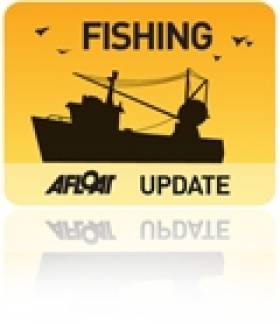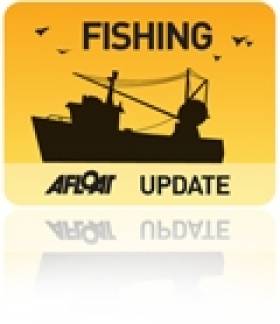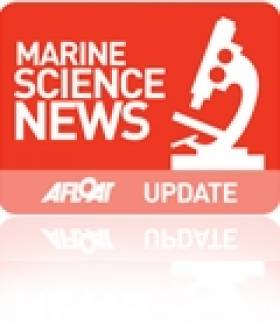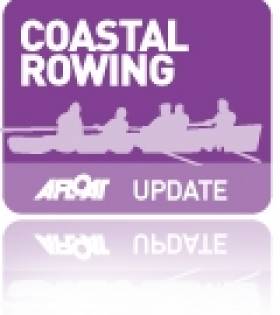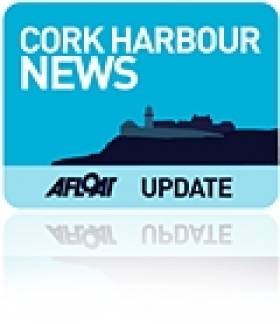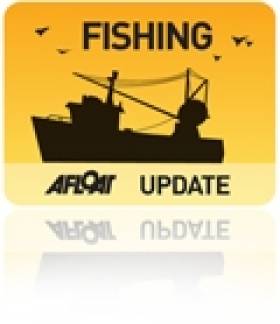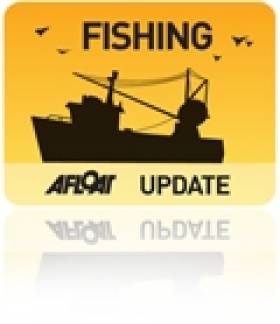Displaying items by tag: Simon Coveney
Irish Skipper Expo Visitor Numbers 'Exceed Expectations'
#FISHING - The 2012 Irish Skipper Expo has been hailed by organisers as the most successful to date, as World Fishing reports.
Over 100 companies displayed their products and services to more than 4,500 visitors from the fishing industry and retail and catering sectors at the Skipper Expo International 2012, held at the Galway Bay Hotel on 24-25 February.
As previously reported on Afloat.ie, Marine Minister Simon Coveney was on hand to launch a new initiative promoting the use of selective fishing nets, and he was full of praise for the weekend-long exposition.
“I am very impressed by the scale and expanse of this event which showcases a wide range of products and services for the fishing industry," he said. "While visiting the stands, I was able to meet and discuss with fishermen current issues and also get a good understanding of the latest developments and innovations in their industry.”
Sharon Boyle, event manager at organisers Mara Media Ltd, added: "The support from the industry continues to be very strong for this show and the number of visitors during the two-day event once more exceeded expectations in what was a very busy weekend.
"Dates for next year’s show are 1-2 March, being held once more at the Galway Bay Hotel.”
Fishing Industry Welcomes Selective Nets, Grant Aid at Irish Skipper Expo
#FISHING - Minister for the Marine Simon Coveney briefed the Irish Skipper Expo in Galway last weekend on a new initiative promoting the use of selective conservation fishing nets, which allow young fish to escape.
Under the initiative in the Celtic Sea, additional quotas of up to 25% will be made available by the minister to skippers of Irish fishing boats which use an escape panel in their nets, allowing young whiting and haddock to escape.
The escape panel, developed by the Irish industry, has been endorsed at EU level and is expected to be a mandatory requirement later in the year.
Minister Coveney said on Saturday: “The use of this panel will significantly reduce discards of juvenile whiting and haddock in the Celtic Sea, allowing juvenile fish to grow and mature and contribute to increased stock size and returns for fishermen in future years.
"I believe that this offers an example of a practical approach to dealing effectively with the discards problem and retention of a flexible quota allocation system that we should take forward in the context of the Common Fisheries Policy Review."
In other news, Bord Iascaigh Mhara (BIM) announced €1.5 million in grant aid for the Irish fishing industry at the expo.
A spokesperson for BIM confirmed to the Galway Independent that the funding will be available to industry through a variety of schemes including fleet safety, seafood environmental management, lobster V-notching and coastal action groups.
Over 100 companies displayed their products and services to fishermen at the Irish Skipper Expo International 2012, held at the Galway Bay Hotel on 24-25 February.
- Fishing
- commercial fishing
- Minister for the Marine
- Simon Coveney
- Irish Skipper Expo
- Skipper Expo International
- 2012
- Galway Bay Hotel
- Galway
- conservation
- selective
- quota
- Celtic sea
- initiative
- discards
- grant aid
- Bord Iascaigh Mhara
- BIM
- Funding
- Coastal
- Seafood
- whiting
- haddock
- juvenile fish
- Common Fisheries Policy
Minister Launches Consultation on Harnessing Ireland's Ocean Wealth
#NEWS UPDATE - Minister for the Marine Simon Coveney has launched a public consultation process on harnessing the potential of Ireland's vast marine resources.
Our Ocean Wealth is calling for input into how Ireland can best capitalise on the trillion-euro global market for marine products and services, from seafood and tourism to shipping, oil and gas, renewable ocean energy and marine science.
Launching the consultation, Minister Coveney said: "We need to change the way we in Ireland think about the sea and look for new opportunities to harness the potential of our 220-million-acre marine resource.
"This government is determined to generate the momentum to drive forward a new era of sustainable economic development across the maritime sectors - we must avail of these opportunities to assist in our recovery. We want your help to shape our plan, to shape our future and to assist in our drive towards our nation's economic recovery."
The consultation process is a step towards developing an Integrated Marine Plan for Ireland intended to grow the percentage of GDP generated by the country's marine resource, which covers an area 10 times the size of Ireland's land mass.
The minister added: "We need an Integrated Marine Plan to harness our ocean wealth, get the environment right for investment and use the potential of our marine economy to create jobs in a sustainable manner."
The consultation phase will be open until 31 March with an aim to publish the Integrated Marine Plan during the summer. For more details visit www.ouroceanwealth.ie.
Coveney to Address Malahide 'Marine Economy' Conference
#MARINE – Simon Coveney, T.D., Minister for Agriculture, Food and the Marine will be a keynote speaker at 'The Atlantic Area Conference, the Marine Economy' – a key component of the EU Integrated Strategy for the Atlantic Area", hosted by the Border, Midland and Western Regional Assembly on 7th February 2012. will provide a unique opportunity to inform the various stakeholder groups on the European Union Strategy for the Atlantic (EUSA) which was officially launched in Lisbon (Portugal) on 28th November 2011.
Keynote speakers will include: Mr. Simon Coveney, T.D., Minister for Agriculture, Food and the Marine; Mr. Matthew King, Head of Unit, Maritime Policy for the Atlantic Space, DG MARE, European Commission. Other speakers will include representatives from the Atlantic Area Programme Managing Authority, the Conference of Peripheral Maritime Regions (CPMR), the Marine Institute and a selection of Atlantic Area approved marine projects.
Presentations will outline the aims and objectives of the Atlantic Strategy as a mechanism to support growth and job creation through the sustainable development of our shared Atlantic marine resources.
Bantry 2012 Launches 'Seamanship Challenge' this Month
#BANTRY2012 – A spectacular display of seamanship for Cork this Summer will be officially launched by Minister for the Marine Simon Coveney TD on January 27th when details of the Bantry 2012 Challenge are revealed. As well as a top sporting story organisers say it's also a tale of how tight knit coastal communities across the world have forged strong interantional links thanks to an initial idea in West Cork.
300 competitors from 16 nations are expected in July when replicas of the Bantry Bay longboat, the oldest surviving vessel in the French navy are raced under sail and oar.
The international crews will take part in a week long event in ten events both on and off the water. The prestigious event for the West cork venue is known as the 'Atlantic Challenge Bantry Bay Gig World Championships'.
Two years ago, as previously reported in Afloat, the Bantry Bay crew, soared in second place, while representing Ireland in the Atlantic Rowing Challenge in Midland Canada.
Competing on Lake Huron, one of the five Great Lakes the Bantry Bay Crew displayed huge amounts of physical and mental strength as they accomplished first place in their first three races.
The Atlantic Challenge is held every other year and sponsors a friendly contest of seamanship in Bantry Bay gigs. Founded by an American native Lance Lee, the Atlantic Challenge aims to build trust among nations and form a community of youth and adults from many countries, while also encouraging the practice of traditional maritime skills.
The boats measure almost 40-foot in length and hold 13 crew. Each boat uses a mainsail, foresail and mizzen.
The competition starts in Bantry on July 21st.
Haulbowline Toxic Waste Site Will Be Cleaned Up by 2014 Says Govt
#CORK HARBOUR - The Government has finally set a deadline for the clean-up of the toxic waste site on Haulbowline Island in Cork Harbour, under threat of massive fines from the European Commission.
RTÉ News reports that a two-and-a-half year deadline has been set to complete the sanitation of the illegal dump on the island at the site of the former Irish Steel/Ispat plant.
Some 500,000 tonnes of waste, including toxic heavy metals and cancer-causing materials, have been blamed for the area's notoriety in having one of the highest cancer rates in Ireland.
As previously reported on Afloat.ie, in October last the Government signed off on a €40m package to begin clean-up of the toxic waste site on the island.
In an editorial yesterday, the Irish Examiner welcomed the Government's decision, but emphasised it was long overdue.
"[It] cannot dispel the great frustration that it has taken so very long to do what should have been done years ago," the paper said.
"To this day nobody has explained how an illegal dump of this scale was allowed to develop on a site that is not exactly secluded, remote or out of the public eye - it is, after all, just next door to the country’s main naval base."
The Irish Examiner also reports on worries that the toxic waste may never be fully removed from the island, but rather sealed off and made impermeable.
Minister for the Marine Simon Coveney was quoted as saying: "This whole clean-up plan will be peer reviewed so it’s best practice but it could be better to contain the material onsite rather than remove it.
"We will be doing all that is reasonable to ensure the site is safe."
Minister Shows Displeasure With Euro Fishery Plans
#FISHING - The Minister for the Marine has spoken out over plans by the European Commission to make cuts in certain fish stocks that could see €65 million in lost earnings for Ireland's fishing fleet.
According to The Irish Times, Minister Simon Coveney said there was "very credible data prepared by the Marine Institute to back up" the case against proposals by EU maritime affairs commissioner Maria Damanaki to cut certain stocks by as much as 25%.
He told the paper he would "challenge anyone to say we are not sticking with scientific advice", and also suggested that the fishing industry is being more responsible in its own proposals.
"The European Commission is recommending a 60 per cent increase in the total allowable catch for Celtic Sea herring, whereas the industry is seeking 30 per cent as a more responsible approach,” said Minister Coveney.
“So this shows it is not true to say that fishermen are irresponsible, as some would suggest."
EU fish talks continue today in Brussels. The Irish Times has more on the story HERE.
Marine Escapes Cuts in Latest Budget
#BUDGET - Coastguard and lifeboat services, mountain rescue and the Commissioners of Irish Lights will not face any further funding cuts in the latest Budget, according to the Minister for Transport.
The Irish Times reports that, following the reduction of his department's budget, Minister Leo Varakdar stated that substantial cuts have already occurred in the maritime safety sector.
Moreover, he announced an increase in the maritime budget from €70.5 million to €80.3 million, due to provisions for the new Irish Coast Guard helicopter contract.
Earlier this week, Minister for Agriculture, Food and the Marine, Simon Coveney, underlined the importance of the marine sector to Ireland's coastal communities.
As previously reported on Afloat.ie, Minister Coveney announced a round of expenditure estimates on Monday which include increased funding for investment in processing, aquaculture and fishery harbours.
Coveney Underlines Importance of Marine to Coastal Communities
#BUDGET – Announcing his expenditure estimates for 2012 today the Minister for Agriculture, Food and the Marine, Simon Coveney TD said The marine and fisheries sector is particularly important to coastal communities and savings have been made through redeployments at a number of state agencies. The Sea Fisheries Protection Authority (SFPA) where Revised arrangements for meetings & communications with port offices saved €300,000 per annum. At the Marine Institute Internal redeployment will make savings of €304,000 per annum. Reduced rental and storage costs at Bord Isacaigh Mhara will lead to savings of €138,000 per annum
In addition to funding for investment schemes in the processing sector, aquaculture development and fishery harbours, the Minister said that he is providing for an increase in the grant-in-aid for BIM in recognition of the on-going valuable role which it plays in the development of the fishing sector but also in view of the added responsibility which it will have in relation to the deep sea aquaculture.
The Fishery Harbour and Coastal Infrastructure Development Capital Programme provides funding for works at the six State-owned Fishery Harbour Centres, (Howth, Dunmore East, Castletownbere, Dingle, Ros a Mhíl and Killybegs) as well as other Local Authority owned harbours and landing places around the coast.
Funding allocated under this programme will be used for the improvement of the Fishery Harbour Centres to ensure the future viability of the fishing industry, bring the Fishery Harbour Centres up to a best in class standard, reduce congestion and improve safety for all harbour users.
This programme enhances harbour infrastructure, provides much needed employment in coastal communities during the construction phase and establishes a platform to create and support sustained employment in the fishing, aquaculture and marine leisure sectors.
Coveney Seeks British Support on Mackerel
The meeting took place in Luxembourg, where Minister Coveney is attending an EU Council of Agriculture & Fisheries' Ministers.
The Ministers discussed the ongoing mackerel negotiations in London, which are critical for their respective fishing industries, which together have the majority of the EU mackerel catch. Ministers agreed that the current unrestricted, irresponsible fishing of mackerel by Iceland and the Faroe Islands was totally unacceptable and would result, if continued at its current level, in the destruction of the stock.
The Ministers agreed to work together to secure an agreement on a fair share of Mackerel for Iceland and the Faroes. Minister Coveney said "I appreciate that serious efforts are underway to reach agreement on the share out of Mackerel, which is Ireland's most important fishery. I am very concerned that an agreement is not secured at a high cost as the share given to Iceland and the Faroes involves a reduction in Ireland's share. The share agreed, therefore, must be fair and proportionate. I welcome the outcome of today's meeting with my Ministerial counterparts to closely cooperate in the negotiations, in order to protect the interests of our fishing industry, which is dependent on a sustainably managed Mackerel stock."
Minister Coveney also said that the Ministers had agreed "to strongly demand trade sanctions, promised by Commissioner Damanaki, in the event that either Iceland or the Faroes are not prepared to stop their irresponsible fishing."
In addition to their discussions on the mackerel issue, the Ministers also discussed progress and their respective priorities on the reform of the CFP and the upcoming negotiations on TACs and quotas.


























